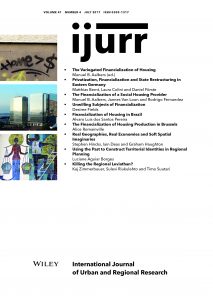This article focuses on the financialization of housing production in the Brussels-Capital Region, examining the increased presence and use of financial capital in housing production. Information collected by local administrations when granting building permits is used to undertake a large-scale examination of companies involved in housing provision in Brussels in the 2000s in order to identify the origins of capital invested in housing development projects and to assess to what extent it can be considered as ‘financialized’. The use of this data set allows me to estimate the ‘market share’ of financial capital in housing production and to analyse the geography of these investments in the built environment. This spatial analysis also provides some insights for a discussion about the possible social consequences of this influx of financial capital into the urban space. The task of empirically ‘measuring’ financialization raises numerous methodological questions. A choice has to be made between a wide range of definitions, both for financial activities and the financialization process. Moreover, for the purpose of quantifying the phenomenon, these concepts are made operational and turned into indicators. In addition to providing information about the investment of financial capital in housing production and the concrete forms it may take in a city such as Brussels, I venture to suggest that this article also contributes to the methodological ‘toolbox’ available to researchers in the field of financialization.

